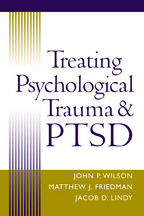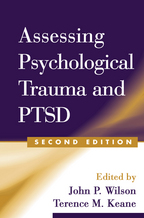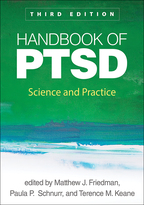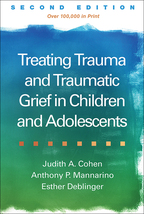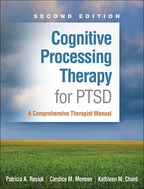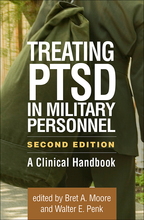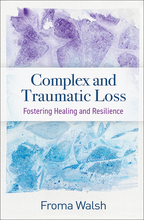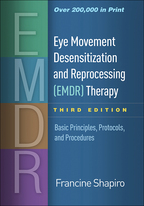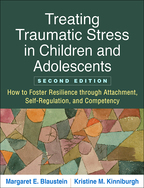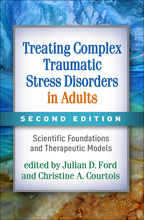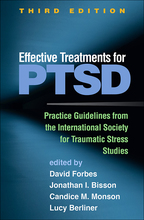Treating Psychological Trauma and PTSD
Edited by John P. Wilson, Matthew J. Friedman, and Jacob D. Lindy
HardcoverPaperbacke-bookprint + e-book
Hardcover
orderSeptember 21, 2001
ISBN 9781572306875
Price: $92.00 467 Pages
Size: 6" x 9"
Paperback
orderJanuary 13, 2004
ISBN 9781593850173
Price: $61.00467 Pages
Size: 6" x 9"
Sign up for emails on upcoming titles on Trauma & PTSD (with special discounts)!
“An authoritative volume that should be on the required reading list for any serious course on trauma, stress, posttraumatic stress disorder (PTSD), victimology, or abnormal psychology or clinical psychology practicum....It broadens the reader's perceptions of psychopathology and provides a much-needed lens for understanding both catastrophic trauma and the inevitable, pervasive, smallerbut commontrauma that goes unrecognized in everyday life.[Chapters] are informed by the latest theory and clinical research and describe a broad array of effective interventions and fine-tuned treatment goals.”

—Psychiatric Services
“This scholarly and lucid book offers a comprehensive, 'state-of-the-art' schema for the treatment of multiple aspects of psychological trauma....Will positively affect trauma research and treatment over the next decade.”

—International Journal of Group Psychotherapy
“Precise and relevant, a comprehensive review of the history, theory, and treatment of PTSD....I find this an essential text in my graduate counseling course.”

—James Halpern, PhD, Department of Psychology, State University of New York at New Paltz
“Wilson, Friedman, and Lindy define the theory of PTSD treatment with authority and clarity. Readers will appreciate how well the volume integrates the scientific, intellectual, and ethical principles for choosing effective clinical interventions. As much a 'why to' as a 'how to' book, this is a volume to be owned by all serious PTSD scholars and practitioners.”

—Frank M Ochberg, MD, former Associate Director, National Institute of Mental Health
“The perennial request of trauma practitioners is 'Give me something I can use—something practical!' This text defines the major themes of recovery across populations and relates these goals to specific interventions and techniques. Adding the areas of attachment/intimacy and interpersonal relationships and self/identity and life course development to the 'basic three' of PTSD (intrusion, avoidance, physiological symptoms) fills in previously missing gaps. This is one of the first volumes to address PTSD treatment from a non-unitary perspective, acknowledging that traumatic responses exist on a continuum and presenting treatment goals that apply to all aspects of the disorder. It is a great step forward and a 'must read.'”

—Mary Beth Williams, PhD, LCSW, CTS, coauthor of Life after Trauma
“The construct of PTSD and its underlying theory have been challenged by recent advances in research and practice. This book makes a daring attempt to redraw the picture, representing a sort of conceptual avant-garde. Using the construct of allostatic load, the book offers new theory and clinical approaches. The reader will find novelty, excitement, controversy, and much food for thought.”

—Arieh Y. Shalev, MD, Department of Psychiatry, Hadassah University Hospital, Israel
—Psychiatric Services
“This scholarly and lucid book offers a comprehensive, 'state-of-the-art' schema for the treatment of multiple aspects of psychological trauma....Will positively affect trauma research and treatment over the next decade.”
—International Journal of Group Psychotherapy
“Precise and relevant, a comprehensive review of the history, theory, and treatment of PTSD....I find this an essential text in my graduate counseling course.”
—James Halpern, PhD, Department of Psychology, State University of New York at New Paltz
“Wilson, Friedman, and Lindy define the theory of PTSD treatment with authority and clarity. Readers will appreciate how well the volume integrates the scientific, intellectual, and ethical principles for choosing effective clinical interventions. As much a 'why to' as a 'how to' book, this is a volume to be owned by all serious PTSD scholars and practitioners.”
—Frank M Ochberg, MD, former Associate Director, National Institute of Mental Health
“The perennial request of trauma practitioners is 'Give me something I can use—something practical!' This text defines the major themes of recovery across populations and relates these goals to specific interventions and techniques. Adding the areas of attachment/intimacy and interpersonal relationships and self/identity and life course development to the 'basic three' of PTSD (intrusion, avoidance, physiological symptoms) fills in previously missing gaps. This is one of the first volumes to address PTSD treatment from a non-unitary perspective, acknowledging that traumatic responses exist on a continuum and presenting treatment goals that apply to all aspects of the disorder. It is a great step forward and a 'must read.'”
—Mary Beth Williams, PhD, LCSW, CTS, coauthor of Life after Trauma
“The construct of PTSD and its underlying theory have been challenged by recent advances in research and practice. This book makes a daring attempt to redraw the picture, representing a sort of conceptual avant-garde. Using the construct of allostatic load, the book offers new theory and clinical approaches. The reader will find novelty, excitement, controversy, and much food for thought.”
—Arieh Y. Shalev, MD, Department of Psychiatry, Hadassah University Hospital, Israel

